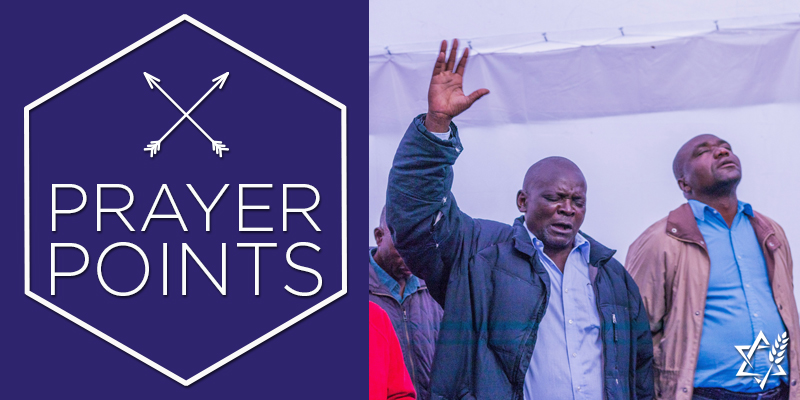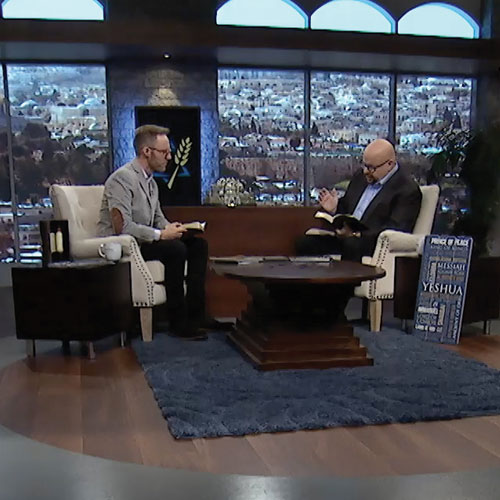Check out our new online portal!




“The Lord is good to those whose hope is in him; to the one who seeks him. It is good to wait quietly for the salvation of the Lord”
Lamentations 3:25-26 (NIV)
I pray God’s faithful goodness for your life this week, as the above Scripture in Lamentations promises to those whose hope is in Him.
In recent news, it seems to be a love-hate relationship between Israel and Jordan.
Publicly, Jordan is pushing for a two-state solution between Israel and Palestine. However, back-channel conversations imply that Jordan’s security and military leaders would rather side with Israel over the Palestinian Authority (PA).
With tensions rising inside Jordan, this is a story you’ll want to keep tabs on. Here’s what we know...
Last week Jordanian Foreign Minister Ayman Safadi warned that Israel’s West Bank annexation plan would “kill the two-state solution.” This comes amid the appearance of a step-up in coordination between Jordan and the PA to “foil Israel’s plan to extend its sovereignty into parts of the West Bank, including the Jordan Valley. This is according to the Jerusalem Post.
In an unexpected visit to the Palestinian capital of Ramallah last week, Safadi is said to have delivered a message from Jordanian King Abdullah to PA President Mahmoud Abbas, emphasizing Jordan’s strong opposition to Israel’s annexation plan.
Hussein al-Sheikh, a senior Palestinian official, said that the Jordanian minister’s visit was “part of a joint effort to confront the Israeli annexation plan and its repercussions on the region.”
Meanwhile, in less public conversations, Jordan, which must ultimately be on board with any Israeli-Palestinian agreement on the West Bank, seems to be siding more with Israel.
Israel Hayom, the online news and opinion magazine, quoted a senior Jordanian official last week as saying, “The Palestinian interest is obviously important to us, but what’s more acute from our perspective is Jordan’s national and security interest. . . . we prefer an [Israel Defense Force] presence west of the kingdom in the Jordan Valley over any other alternative. . . . We have no interest or intention of damaging our security relations with Israel on behalf of the Palestinians,” he said.
When you give a gift of $30 or more in support of Jewish people in Israel, we’ll bless you by sending the Hear O’ Israel Journal and Bookmark. Use the handsome journal to record your personal thoughts, Bible study notes, or prayer requests. Each of its 400 lined, gold-edged pages features a Scripture verse. The leather-like cover is dual-tone maroon, debossed with the words of Deuteronomy 6:4 – “Hear O Israel, the Lord our God, the Lord is One.” And keep your place in any book with this deluxe, leather-like bookmark. Like the journal, it carries the words of Deuteronomy 6:4 in gold foil. Request one today!
Amid this conversation, the terror organization Hamas got into the act. Senior Hamas official Izzat al-Risheq, in an obvious attempt to flatter the Jordanian leadership, said that Hamas “appreciates Jordan’s honorable position . . . in support of the legitimate rights of the Palestinian people. [Israel’s goal for the Jordan Valley] constitutes an existential threat to the present and future of Palestine, and a real danger to Jordan.”
In an accusation clearly directed at Israel, he continued that Hamas condemns “attempts by some parties to exert pressure and political blackmail against Jordan because of its courageous stance towards this criminal plot.”
The unnamed Jordanian official allowed that PA officials are disappointed over the unofficial positions of Arab countries on the matter of Israeli sovereignty. “No one is asking why the Arab League isn’t convening, despite the Palestinians’ lamentations over Israel’s intention to implement the annexation plan,” he said.
Across the Middle-East, Arab nations are occupied with their own internal problems and security issues. They will probably not risk ruining their relationship with the Trump administration. And, for Jordan especially, their security is paramount.
The Palestinians are angry that the support of long-standing Arab allies — which they feel entitled to — appears to be evaporating as debates over Israeli sovereignty and the future of the West Bank drag on.
Stay tuned.
Join me in praying for:

The many congregations we either help support or partner with are on our hearts at this time. Two members of our Congregation and Leadership Development team were scheduled to make congregational visits in Africa in May. As you might guess, their visits had to be canceled this year due to COVID-19.
We are in ongoing contact with these leaders and congregations and are also staying up to date as to how the coronavirus is impacting their nations and communities. We missed seeing them this spring and would have loved to be able to pray over them in person. Instead, will you join us in wholeheartedly praying for them from afar, asking the Lord to visit them powerfully by His Spirit?
Here is the latest as of this writing:
UPDATES:
PRAISES:
REQUESTS – Please pray for:
LET’S PRAY:
Lord, please strengthen our Prayer Partners as they lift up these nations, congregations and leaders in prayer. Who knows but that You might use these very prayers to lift the head of a leader bowed under the weight of shepherding his congregation in a time such as this? May we who pray and those who lead be encouraged and not wearied by well-doing. May we know that You, as Lord of the harvest, will bring great fruit from faithfulness, in due time. In Yeshua’s name, AMEN.
“The Lord gives strength to His people; the Lord blesses His people with peace”
Psalm 29:11 (NIV)
Do you get the sense the world is spinning out of control? I know it feels that way to me. Every day a new crisis or reason for worry seems to spring out of nowhere.
That’s why I’m so thankful we know God is in control. He isn’t taken by surprise or overwhelmed by circumstances. Even when we are surprised or overwhelmed, the Psalm above says that He gives us strength and peace. I don’t know about you, but I can always use more of both.
If you’re feeling overwhelmed today, especially as we look at the news coming out of Israel, I encourage you to ask the Lord for strength and peace. Pray strength and peace for yourself, your family, friends, neighbors, region, and an extra measure for Israel and the Jewish people. God will hear you.
If you want more encouragement in these chaotic times, please take a look at our daily devotional series Hope In The Midst.
Now, let’s take a look at where God’s strength and peace are needed right now in Israel.
On Sunday, Sigal Sadetzky, the head of health services at the Health Ministry, told Israel’s parliament that the country is seeing the start of a second wave of the pandemic. Over the last month the government took steps to reopen the economy and roll back restrictions.
“We had a long period of more than two weeks with a calm of less than 20 infections a day, and it started to climb and climb, and now we are seeing close to 200 new sick people a day,” Sadetzky said, according to The Times of Israel.
“What characterizes the wave we are seeing now is that it’s across the country. We don’t really know how to identify at-risk groups,” she said.
Late last week, Prime Minister Benjamin Netanyahu warned Israelis that the government will have to reimpose the lockdown if social distancing and other preventive measures aren’t practiced to avoid the spread of COVID-19.
"I have good news and not-so-good news. The good news is that our economy is picking up pace," Netanyahu said, according to Israel Hayom, an Israeli national newspaper.
"The not-so-good news is our community spread levels," he continued, referring to the recent increase of COVID-19 infections within Israel. "We are seeing the start of a climb, and the reproduction number [the time it takes for cases to multiply] is 10 days. If this continues, we will have to reintroduce the lockdown measures."
When you give a gift of $40 or more to provide support for Messianic ministries in Israel and critical resources to Jewish people around the world, we’d like to bless you by sending our Jeremiah 29:11 Plaque. Featuring a well-loved Bible verse, this lovely piece of art makes an inspiring gift for friends, newlyweds, retirees or even yourself. Request one today!
On a positive note, Israeli researchers have identified short amino acid sequences – often referred to as the “building blocks of life” – that could help develop a vaccine against the novel coronavirus.
The other big news story in Israel continues to be the potential West Bank annexation – including how the international community is responding as well as the Palestinian Authority (PA).
This is the headline of an op-ed piece written last week by United Arab Emirates Ambassador to Washington Yousef Al Otaiba for an Israeli newspaper:
Annexation will be a serious setback for better relations with the Arab world
The ambassador said he wanted to speak directly to the Israeli public. His piece in Ynet News included these words:
“A unilateral and deliberate act, annexation is the illegal seizure of Palestinian land. It defies the Arab – and indeed the international – consensus on the Palestinian right to self-determination.”
He continued, “It will ignite violence and rouse extremists. It will send shock waves around the region, especially in Jordan whose stability – often taken for granted – benefits the entire region, particularly Israel.”
Indeed, news earlier this week said that Jordan’s King Abdullah II refused to speak with Netanyahu over the phone. He also wouldn’t specify a date for a meeting requested by Defense Minister and Alternate Prime Minister Benny Gantz, according to the Palestinian Ma’an news agency.
A Jordanian official told Ma’an the refusal came because of Israel’s plans to annex parts of the West Bank in July, according to The Jerusalem Post.
At the same time, it seems the PA is struggling with it’s response to Israel concerning the potential annexation, as evidenced in this headline:
Palestinian leadership struggle to rally public against annexation
Last week, the PA coordinated a public rally in Manara Square to protest the annexation, but could only gather about 200 people. Around the same time, there was a well-attended protest of the PA's decision to cut the salaries of many of its government employees.
The fact that West Bank citizens will take to the streets over the economic crisis but not annexation indicates a lack of confidence in the leadership.
“The disconnect between the leadership and the public is worsening and what happened at Manara is a symptom of it,” said a longtime member of Palestinian President Mahmoud Abbas’ Fatah party, according to Haaretz.com, the online edition of Haaretz Newspaper in Israel.
Join me in praying for God to give His people strength and peace in the days ahead. Please pray with me for:

“Likewise know that wisdom is sweet to your soul. If you find it, there will be a future, and your hope will not be cut off”
Proverbs 24:14 (TLV)
I am focusing us on wisdom because with all that is going on in our world today, wisdom is something we can all use more of, don’t you agree?
Look at the verse above from Proverbs – wisdom is linked to having a future and hope that will last. Certainly something we all desire. And if we pray for wisdom earnestly, God will grant it.
When you read the news stories I’ve included here, I hope you will consider the importance of wisdom for all leaders and especially those in Israel and the Middle East. Pray with me that each one will seek wisdom in their lives and their decision making in the days ahead.
Israeli Prime Minister Benjamin Netanyahu has made it clear that he wants to move forward with West Bank annexation plans as early as July 1. These plans would affirm Israel’s sovereignty over 30 percent of the West Bank, including all settlements and the Jordan Valley.
I say “affirm” because while the U.N. ignores it, historically and legally Israel already maintains sovereignty over all the land between the Jordan River and the Mediterranean Sea. This was first recognized in the 1921 League of Nations’ Mandate for Palestine; adopted under Article 80 of the U.N. Charter; and no agreement since has altered it.
Still, it seems unlikely the U.S. administration will approve this move by the July 1 date, a source told The Times of Israel last week.
It could take weeks or even several months before the joint U.S.-Israel mapping committee concludes its work. The White House has declared this a precondition that must be met before any go-ahead would be given for annexation. Already, significant delays have happened because of the COVID-19 pandemic.
July 1 is the earliest date the coalition agreement signed by Netanyahu and Defense Minister Benny Gantz’s Blue and White party allows the Prime Minister to bring the issue to a vote in either the cabinet or the Knesset, Israel’s parliament.
According to the coalition deal, the West Bank annexation plan can only move forward in full coordination with the White House.
When you give a gift of $30 or more to provide support for Messianic ministries in Israel and critical resources to Jewish people around the world, we’d like to bless you by sending the book, The Lifestyle of a Watchman. This 21-day journey will help you move to the front lines of prayer – you’ll be encouraged to become more aware of God’s presence and pray His will with confidence. Request yours today!
When Prime Minister Netanyahu stated his intention for Israel to annex the Jewish settlements in the West Bank, Palestinian Authority President Mahmoud Abbas’ was quick to respond. Citing the annexation as another example of continually broken agreements, he grandly declared that the PA was “absolved” of all agreements and understandings with Israel and the U.S.
Unfortunately for Abbas, this leaves the PA in a tricky situation. One of those agreements comes in the form of regular tax revenue transfers from Israel. Last year, these tax transfers made up 60 percent of the PA budget.
This year, with COVID hurting the West Bank economy, the U.S. halting millions of dollars in aid, and a drop in international funding, the PA can’t afford to turn away that money, and the people of the West Bank are going to suffer for it.
Security cooperation is another agreement the PA has “absolved.” This means that PA security forces can no longer access the two-thirds of the West Bank territory under Israeli control.
That puts Israeli security in sole charge of maintaining order and resolving disputes for those regions’ non-Israeli citizens. While I would take Israel’s security over the PA’s security any day of the week, not everyone will see it that way. I’d expect some friction to develop that won’t be good for either side in the long run.
Join me in praying for God to grant wisdom to all who earnestly seek it and thanking Him for His love and hope. Please pray with me for: